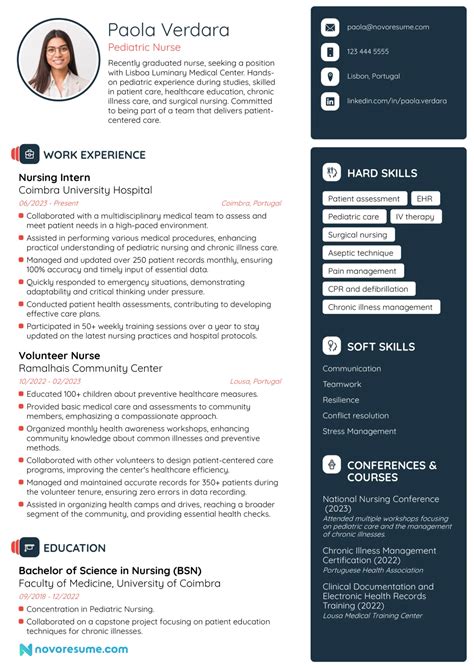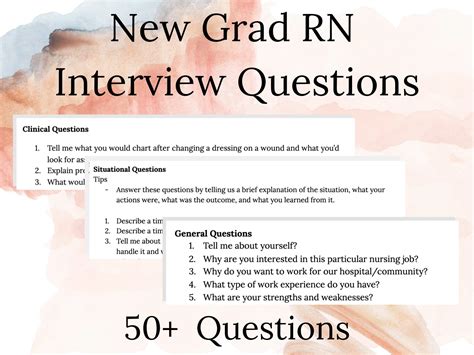Intro
Boost your chances of landing a new grad nursing position with these 5 expert tips. Discover how to tailor your resume, ace nursing interviews, and build a strong professional network. Learn the importance of certifications, online profiles, and relevant experience in securing a new grad nursing job. Get hired with confidence!
As a new nursing graduate, entering the job market can be both exciting and intimidating. With the increasing demand for skilled nurses, it's essential to stand out from the competition and showcase your skills to potential employers. Landing a new grad nursing position requires a strategic approach, and here are five tips to help you increase your chances of success.

Tip 1: Build a Strong Resume and Cover Letter
Your resume and cover letter are often the first impressions you make on potential employers. It's crucial to tailor them to the specific job you're applying for, highlighting relevant skills and experiences. As a new grad, you may not have extensive work experience, but you can focus on:
- Clinical rotations and skills gained during nursing school
- Any relevant coursework or certifications
- Volunteer or extracurricular activities that demonstrate your skills and character
- Relevant soft skills, such as communication, teamwork, and problem-solving
Use language from the job posting to describe your skills and experiences, and be sure to proofread your application materials multiple times for errors.
Resume and Cover Letter Best Practices
- Use a clear and concise format, with bullet points and white space to make your application easy to read
- Use action verbs, such as "assessed," "implemented," and "evaluated," to describe your experiences
- Include relevant keywords from the job posting to help your application pass through applicant tracking systems (ATS)
- Keep your cover letter to one page, and use it to tell a story about why you're the best fit for the job

Tip 2: Prepare for Interviews
Interviews are a critical component of the hiring process, and preparation is key to making a good impression. Research the hospital or healthcare organization, and review the job posting to understand the skills and qualifications required for the position. Practice answering common interview questions, such as:
- Why do you want to work in this specialty or setting?
- What are your strengths and weaknesses?
- Can you give an example of a time when you overcame a challenge?
Interview Preparation Tips
- Review the hospital's mission, values, and culture to demonstrate your alignment with their goals
- Prepare examples of your experiences and skills, using the STAR method ( Situation, Task, Action, Result) to structure your responses
- Practice your responses with a friend or family member, or record yourself to identify areas for improvement
- Bring copies of your resume and references, and be prepared to ask questions during the interview

Tip 3: Network and Make Connections
Networking is a powerful tool for finding job opportunities and getting advice from experienced professionals. Attend job fairs, industry events, and networking sessions to meet people in your desired field. Connect with nurses and healthcare professionals on LinkedIn, and join online communities or forums related to nursing.
Networking Tips
- Be clear and concise about your career goals and job aspirations
- Ask for advice or insights from experienced professionals, rather than simply asking for a job
- Follow up with new contacts to build relationships and stay top of mind
- Use social media to share your experiences, skills, and achievements, and to engage with others in your network

Tip 4: Consider a Nurse Residency Program
Nurse residency programs are designed to support new grad nurses as they transition into practice. These programs provide a structured environment for learning and growth, with mentorship, education, and support from experienced nurses. Many hospitals and healthcare organizations offer nurse residency programs, which can be a great way to gain experience and build your skills.
Nurse Residency Program Benefits
- Structured support and mentorship from experienced nurses
- Opportunities for education and professional development
- Enhanced job satisfaction and retention
- Improved patient outcomes and quality of care

Tip 5: Be Flexible and Open-Minded
As a new grad nurse, you may not land your dream job right away. Be open to different settings, specialties, and shifts, and be willing to learn and adapt. Consider working as a travel nurse or taking a temporary position to gain experience and build your skills.
Flexibility and Open-Mindedness Tips
- Be willing to learn and take on new challenges
- Consider different settings, such as pediatrics, gerontology, or critical care
- Be open to different shifts, including nights, weekends, and holidays
- Use temporary or travel positions as a stepping stone to your dream job

We hope these tips will help you in your job search and provide you with a strong foundation for a successful nursing career. Remember to stay positive, persistent, and open-minded, and don't be afraid to ask for help along the way.
What are the most common interview questions for new grad nurses?
+Common interview questions for new grad nurses include "Why do you want to work in this specialty or setting?", "What are your strengths and weaknesses?", and "Can you give an example of a time when you overcame a challenge?"
How can I stand out from other new grad nurse applicants?
+To stand out from other new grad nurse applicants, focus on building a strong resume and cover letter, preparing for interviews, networking and making connections, considering a nurse residency program, and being flexible and open-minded.
What are the benefits of a nurse residency program?
+Nurse residency programs provide structured support and mentorship from experienced nurses, opportunities for education and professional development, enhanced job satisfaction and retention, and improved patient outcomes and quality of care.
